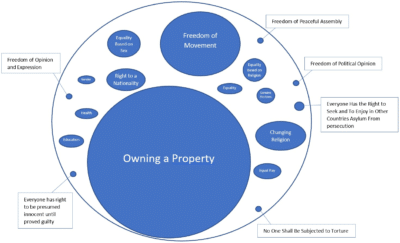Human Rights in the MENA Region
By Isam Junaidi, WI-HER Finance and Accounting Manager
Human Rights in the MENA region have always been seen as a grant rather than a birthright – people weren’t born equal. In our society people are either lords or commoners, and the laws are only applied to the latter.
Imagine human rights presented in a big circle. Within this circle lies all the 30 articles that form the Universal Declaration of Human Rights (as shown in the diagram below). According to my understanding, nothing is wrong with the sizes of the circles; everything is presented in the weight that that particular right is given. That is because there’s a formula in the MENA region. Whenever regimes expand one circle, it is at the expense of the others. In other words, if they expand one circle by 1%, another circle is reduced by 2-4%.

For example, for the past 20 years in Jordan the government has been pushing towards equal pay, more women rights, and reducing discrimination based on religion while also degrading freedom of speech (including on online forums), access to education, and public health.
A similar formula can be seen at work other MENA countries. In Tunisia, the current government pushed for more women rights while limiting freedom of speech and free elections during the recent “soft” coup.
Regimes also use the current situation to achieve more oppression; for instance, in Lebanon, where there has been political unrest, they used the pandemic to impose nationwide lockdown to restrict demonstrations and freedom of speech.
In kingdoms like Saudi Arabia and Jordan, you cannot criticize a member of the royal family; we all know about the assassination of Khashoggi in Turkey and how he was deprived of his right of asylum by taking his life. In Jordan, people are imprisoned for just mentioning a member of the royal family in a destructive or harmful way (by their definition) and are prosecuted in the Security State court, “the same used for terrorist.”
In conclusion, the MENA region has a long way to democracy and a civil society, which can only be achieved by incorporating and taking into consideration people regardless of race, ethnicity, age, gender, religion, sexual orientation, disability, economic status, and other diverse backgrounds in governments and decision making. This should be in addition to free elections and moving away from “prophet decedents” monarchies to elected presidents. Only then can people truly have access to the full array of human rights as detailed in the Universal Declaration of Human Rights.